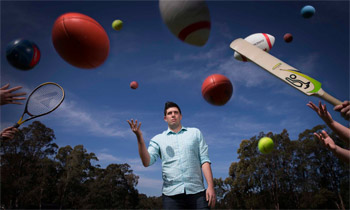Dr Stewart Vella Kid Sport Dropouts Higher Risk of Mental Health Problems Interview

Dr Stewart Vella Kid Sport Dropouts Higher Risk of Mental Health Problems Interview
Australian primary school kids who drop out of organised sport have up to a 20 per cent greater risk of developing mental health problems within three years than those who keep participating according to new research released during Mental Health Week 2014.
The research, to be formally presented at Sports Medicine Australia's be active 2014 conference next week, found that children who dropped out of organised sport between the ages of 8 and 10 had greater psychological difficulties at age 10 than those children still participating in organised sports.
Lead author Dr Stewart Vella of the Early Start Research Institute, University of Wollongong said those children who had dropped out of organised sports reported greater social and emotional problems, as did those who did not participate in organised sport at all.
'We know that sports participation has long been associated with better mental health such as through the development of better social and emotional skills and self-esteem," Dr Vella said.
'We also know that half of all psychological disorders have their onset before the age of 14 years.
'While we were expecting our results to confirm the negative psychological consequences of dropping out of organised sport, we were surprised by the magnitude of the differences, with the total relative increase of risk in mental health problems within three years for kids who drop out between 10 to 20 per cent.
'What was also concerning was the projected rate of sport dropouts among Australian children.
'Based on the dropout rates per year recorded during our study – if this number was to remain consistent throughout childhood and adolescence – it would translate to approximately 250,000 young Australians dropping out of organised sports every year."
Dr Vella said kids who drop out of organised sports should be monitored for psychological difficulties.
'Clubs, coaches, parents and health practitioners should also look out for kids experiencing psychological difficulties who drop out of sport, as a higher level of mental health issues may be experienced immediately prior and subsequent to dropping out."
The research, Associations between sports participation and psychological difficulties during childhood: A two year follow up, examined the mental health of more than four thousand children from the Longitudinal Study of Australia Children, comparing those who participated in sport to those who dropped out of sports or did not participate.
For more information www.beactive2014.org
Interview with Dr Stewart Vella
Question: What originally encouraged you to research kids who drop out of organised sports?
Dr Stewart Vella: Our research has shown that sport participation has many benefits for mental health. The logical next step was to find out what happens when children drop out of organised sports.
Question: Why do you believe school kids who drop out of organised sport have up to a 20 per cent greater risk of developing mental health problems?
Dr Stewart Vella: Children who drop out of sports forfeit significant opportunities to develop social and emotional skills, strong social networks, and supportive adult relationships. This can lead to the increase in risk for mental health problems. However, it is equally likely that children are dropping out of sports because they are starting to experience the warning signs of mental health problems such as behavioural difficulties.
Question: Can you talk us through what mental health problems you are referring to?
Dr Stewart Vella: The increased risk refers to all psychiatric diagnoses, most commonly depression, anxiety disorders and behavioural or conduct problems.
Question: How can parents encourage their kids to stay in sporting groups?
Dr Stewart Vella: Parents should focus on learning, rather than winning. This will help to remove the pressure, stress and anxiety associated with a focus on winning.
Question: Why do you believe the sports dropout rate is increasing amongst Australian children?
Dr Stewart Vella: While the dropout rate is very high, I'm not sure that it has been increasing. I believe that the dropout rate and participation rate have remained steady for almost a decade.
Question: Has the introduction of technology (games, mobile phones, social media) influenced this increase?
Dr Stewart Vella: This would, in part, contribute to the rising levels of sedentary behaviours, which is bad for children's health. This is particularly bad when children drop out of sports and replace these with electronic screen time.
Question: How was this study conducted?
Dr Stewart Vella: This study used data derived from the Longitudinal Study of Australian Children. We followed over 4000 children from age 8 to age 10 and monitored their sports participation and risk for mental health problems.
Question: What do you hope to achieve by presenting these results?
Interview by Brooke Hunter
MORE



